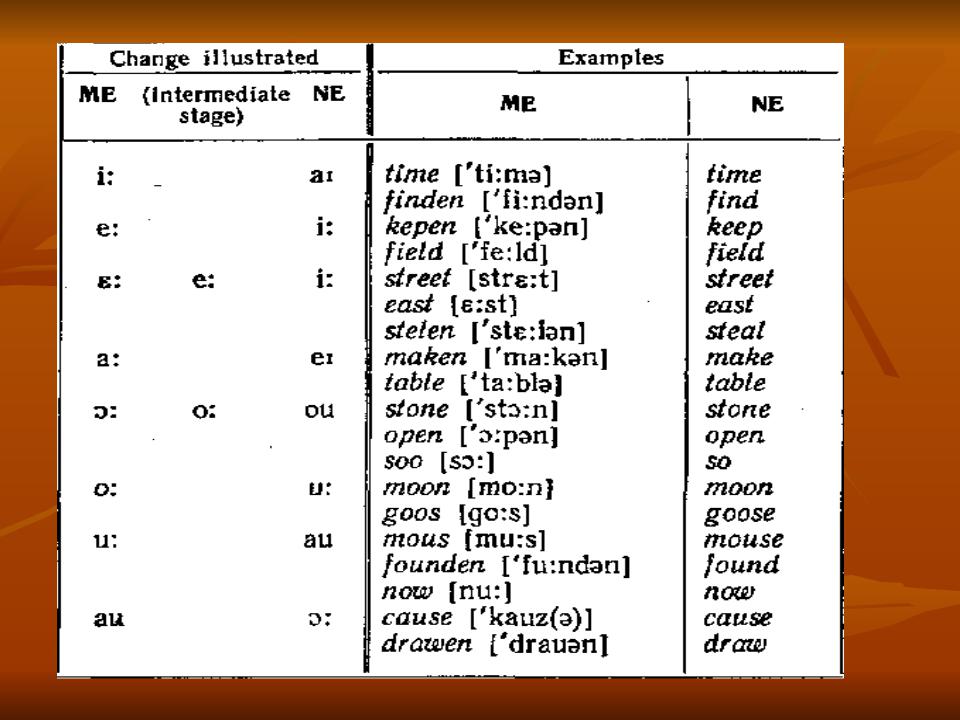
- •EARLY MODERN
- •I. Historical background to the New Standard
- •III. NE Consonant System:Vocalisation of ‘r’;
- •1476 Caxton introduced the printing press to England;
- •The late Middle Ages (14th c.) had seen the triumph of the English
- •Nonetheless Latin still had great prestige as the language of international learning;
- •The reasons for the defeat of Latin
- •The increase in national feeling (XV- XVI c.) that led to a great
- •But, while English was thus establishing its supremacy over Latin, it was at
- •Principal Quantitative Changes
- •b) Shortening before [ɵ, d, t,k]
- •The Great Vowel Shift
- •The changes were “independent” and effected regularly any stressed vowel in any position.
- •Rounding of vowels after /w /
- •the cluster [er] changed to [ar]: e.g. OE deorc – Early ME derk
- •The vocalisation of [r] took place in the 16th or 17th c.
- •2) lengthening
- •If [ə] produced by vocalisation of [r] was preceded by a diphthong, it
- •Early Modern English Grammar
- •Nouns
- •Personal pronouns:
- •The inflectional system of the verb underwent further simplification:
- •Adjectives lost all endings except for in the comparative and superlative forms.
- •In syntax the period (15th -17th c.) sees the continued movement towards an

b) Shortening before [ɵ, d, t,k]
When ME ē was shortened before  [ɵ,d,t,k], it became [ɛ], as in breath,
[ɵ,d,t,k], it became [ɛ], as in breath,
bread, sweat.
When ME ō was shortened before [k,t], it became [ʊ], as in look and foot.

The Great Vowel Shift
(15-late 17th c.)
the GreatVowel Shift (GVS) is a chain-like transformation of the whole ME long vowel system.
The GVS affected only ME long vowels (e.g. keep vs kept).

The changes were “independent” and effected regularly any stressed vowel in any position.
The GVS didn’t add any new sounds to the vowel system. Thus, the modification of the words under the GVS was not reflect in their written forms.


Rounding of vowels after /w /
(18th c.), as in NE swan and watch.
The change didn’t take place if the vowel was followed by a velar consonant, as in twang, wag, wax.

NE Consonant System Vocalisation of [r] = the weakening of [r]
The sonorant [r] began to produce a certain influence upon the preceding vowels in Late ME.
[r] made the preceding vowel more open and retracted:

the cluster [er] changed to [ar]: e.g. OE deorc – Early ME derk – Late ME dark;
although the change of [er] to [ar] was fairly common, it didn’t affect all the words with the given sounds: cf. ME servent, person.

The vocalisation of [r] took place in the 16th or 17th c.
1) diphthongization.
 In Early NE [r] was vocalised when stood after vowels, either finally or followed by another consonant. Losing its consonant character [r] changed into [ə], which was added to the preceding vowel as a glide to form a diphthong: e.g. ME there [ɵɛ:re] NE there.
In Early NE [r] was vocalised when stood after vowels, either finally or followed by another consonant. Losing its consonant character [r] changed into [ə], which was added to the preceding vowel as a glide to form a diphthong: e.g. ME there [ɵɛ:re] NE there.

2) lengthening
Sometimes the only trace left by the loss of [r] was the compensatory lengthening of the preceding vowel: e.g. ME arm [arm] – NE arm.
3) change of quality
under the influence of [r], vowels [e, i,u] became [ə]
In the final unstressed position: ME ridere
– NE rider.

If [ə] produced by vocalisation of [r] was preceded by a diphthong, it was added to the
diphthong to form a triphthong: e.g. ME shour [ʃu:r] – NE shower.
[r] was not vocalised when doubled after consonants and initially: e.g. NE errand, dry, read.
This process didn’t take place in all varieties of English. Those varietes in which it was retained are called rhotic, (cf. non-rhotic)

